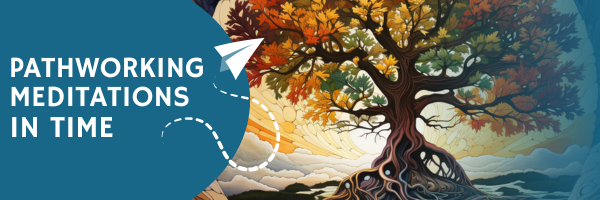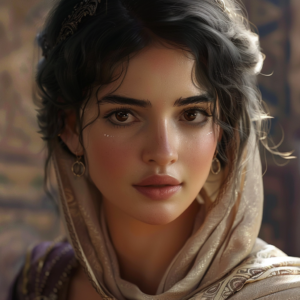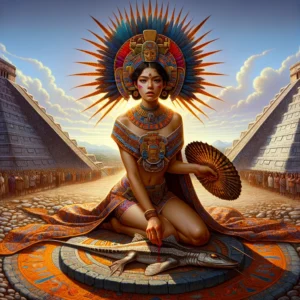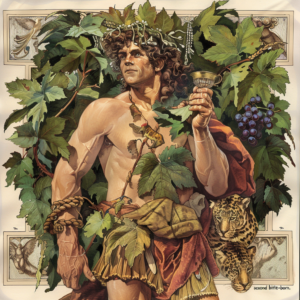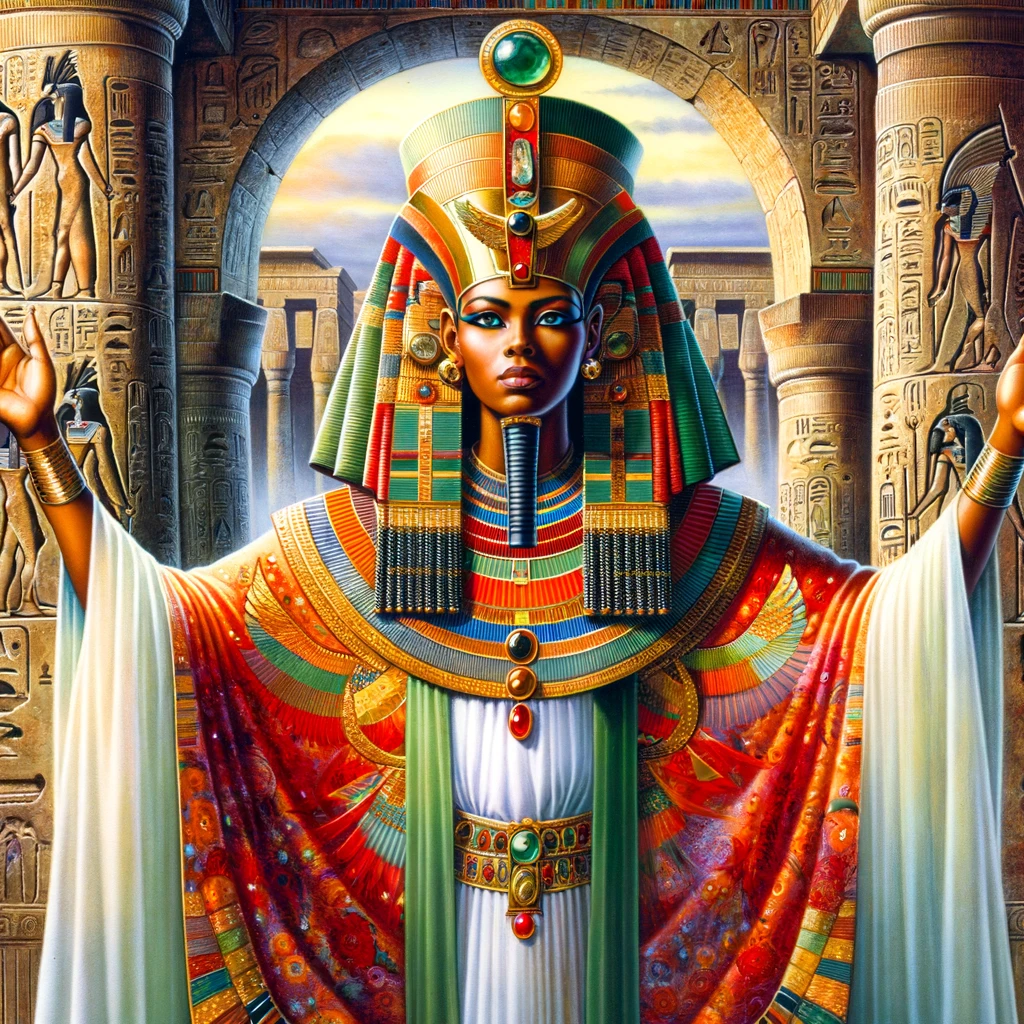
Embracing the Divine:
Prologue: The Whisper of the Nile
In the shadow of ancient Thebes, the river Nile whispered secrets of old, carrying tales of life, death, and rebirth along its vast, fertile banks. Here, in the heart of Egypt, the Festival of Min was celebrated—a vibrant ode to the god of fertility, harvest, and sexuality. As the harvest season approached, the air tingled with anticipation, the promise of renewal and abundance palpable in the city’s bustling streets.
Dawn of the Festival
As the first light of dawn painted the sky with hues of orange and gold, Iset, a young farmer’s daughter, rose with a sense of purpose. This was her first time participating in the Festival of Min, and her heart raced excitedly. The city was alive, streets filling with artisans, dancers, and musicians, each adding their melody to the symphony of celebration. Iset donned her finest linen dress, accentuated with a garland of blue lotus flowers—a symbol of life and victory.
The Grand Procession
The sound of drums beckoned the city’s residents to the temple courtyard. Iset joined the flowing river of people, her eyes wide with wonder. At the forefront, priests carried an ornate statue of Min, his majestic form adorned with gold and precious stones. The crowd swelled in the temple’s vast expanse, their voices rising in a chorus of invocation. “Oh, Min, protector of the harvest, bless us with your vigor,” they chanted their words, a bridge between the heavens and the earth.
The Sacred Rites
The high priest, adorned in a robe of vibrant reds and greens, began the sacred rites in the temple’s inner sanctum. Offerings of barley and lettuce, symbols of fertility, were placed at the feet of Min’s statue. Iset, standing close by, felt the weight of the moment, the gravity of centuries-old traditions unfolding before her. The priest’s voice, deep and resonant, filled the air, recounting the mythological tales of Min, his divine power ensuring the prosperity of the land and its people.
As the congregation gathered within the hallowed walls of the temple, a profound silence settled over the crowd, anticipation hanging heavy in the air. The high priestess, a venerable and imposing figure, stood before the statue of Min, her arms raised in a gesture of invocation. Her voice, clear and resonant, broke the silence, weaving a spell of words that seemed to echo from the very stones of the temple:
“Children of the Nile, bearers of the earth’s bounty, we gather here under the watchful gaze of Min, our guardian and guide. Today, we stand on the sacred ground our ancestors trodden, fertile with their devotion and sustained by their faith. As the river ensures the land’s richness, so does Min ensure our prosperity and vitality. Let us invoke his blessing with hearts full of gratitude and hands full of offerings.
O mighty Min, lord of the harvest, whose strength fuels the sun and fosters the seed, bestow upon us your vigor. As the barley rises from the soil, let our spirits ascend to celebrate your power. Let the lettuce flourish, crisp and abundant, as a testament to your virile nature.
We offer you the fruits of our labor; we lay the hopes of our hearts before you. In the dance of the stems in the wind, in the swell of the river by the rain, in the chorus of our voices raised in song, feel our reverence, respect, and love.
Protect us, O Min, from scarcity and strife. Guide our hands in the planting, our feet in the dance, our hearts in the harmony of life. Let the earth be generous, the harvests hearty, and our homes happy as we honor you with our age-old rites.
Blessed be the ground that nourishes, the water that quenches, and the fire that transforms. Blessed be the coming together of our community under your benevolent gaze to celebrate the sacred act of creation. In your honor, we rejoice, we renew, we regenerate.
Hear us, O Min, and in hearing, be pleased.”
As the high priestess concluded her invocation, the air seemed to thrum with the power of her words. The congregation responded with a heartfelt “So be it,” a chorus of affirmation that resonated through the temple and beyond into the starlit night.
Festival of Fertility
As the rituals concluded, the festival’s more exuberant celebrations took hold. Dancers clad in colorful skirts twirled to the rhythmic beating of tambourines, their movements a mesmerizing dance of joy and desire. In a special grove dedicated to Min, couples participated in rituals celebrating sexuality and procreation, their actions open and unashamed, blessed by the priests as a vital act of worship and communion with the divine.
Feast and Firelight
As night fell, the air filled with roasted meats and freshly baked bread aroma. Torches cast a warm glow over faces flushed with laughter and wine. Iset, her cheeks aglow, moved among the revelers, feeling an unprecedented connection to her community and heritage. The stories told by firelight were of harvests past and of those yet to come, a collective dreaming of abundance and unity.
The Morning of Renewal
In the quiet of the dawn, as the last embers of the night’s fires smoldered softly, Iset walked along the Nile’s edge. The river seemed to approve, its waters a gentle mirror reflecting the infinite sky. She felt changed, reborn in the spirit of Min. As she looked across the fields, golden with promise, she knew that the festival was more than a celebration; it was a reaffirmation of life itself.
Through the eyes of Iset and the heart of Thebes, this story captures the essence of the Festival of Min, weaving together the threads of spirituality, community, and earthly pleasures into a tapestry as rich and enduring as the Nile’s legacy.
No tags for this post.